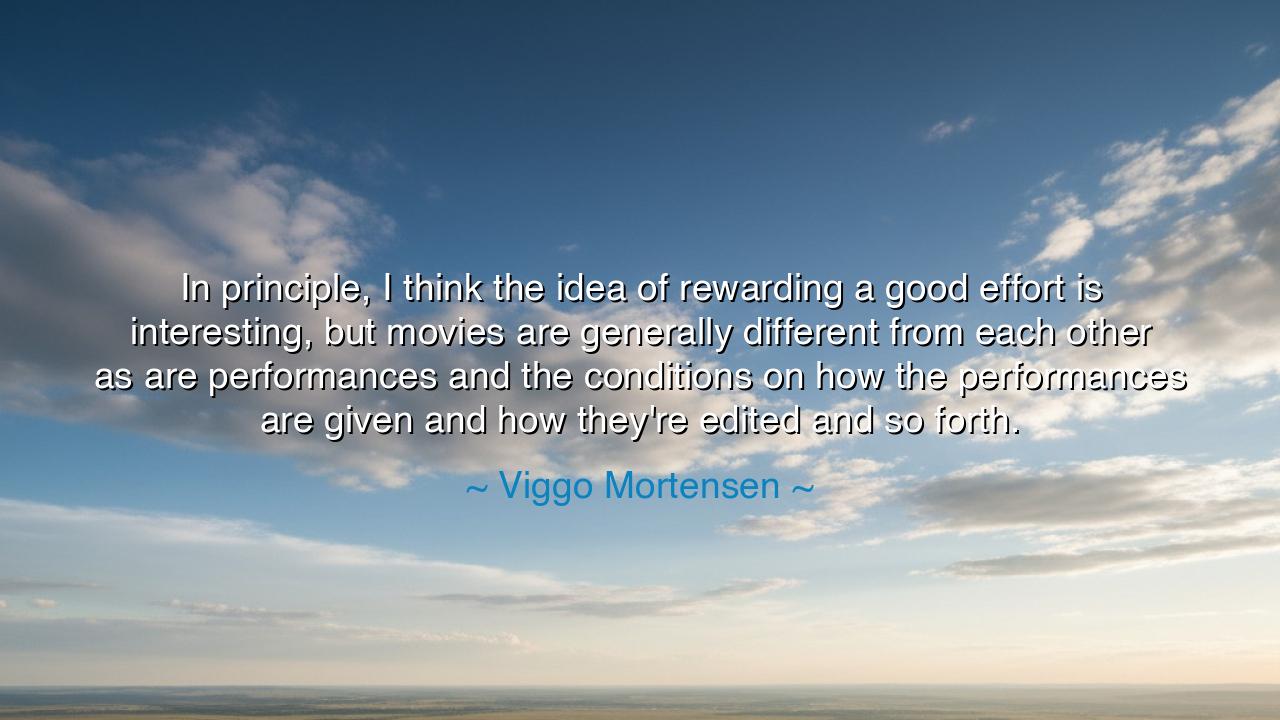
In principle, I think the idea of rewarding a good effort is
In principle, I think the idea of rewarding a good effort is interesting, but movies are generally different from each other as are performances and the conditions on how the performances are given and how they're edited and so forth.






In the intricate dance of life, where each individual strives to leave their mark upon the world, the idea of rewarding effort is a concept that resonates with the very soul of humanity. Viggo Mortensen, in his reflection on the nature of cinema and performance, speaks to the complexity of this notion when he says, "In principle, I think the idea of rewarding a good effort is interesting, but movies are generally different from each other as are performances and the conditions on how the performances are given and how they're edited and so forth." These words reveal a deeper truth about the nature of art and recognition—how effort alone, while worthy of acknowledgment, cannot be the sole measure of a work's true value. In the world of film, as in life, there are countless variables that shape the outcome, and thus no single effort or performance can be measured in isolation.
To understand this, we must look at the ancient world, where the heroes and warriors were often celebrated not only for their strength and bravery, but for the context in which their deeds occurred. Take, for example, the great Homeric epics—in works like the Iliad and the Odyssey, the valor of warriors was never judged by a simple formula of effort. It was their actions within the complex tapestry of war, fate, and divine intervention that determined their legacy. Achilles, though undoubtedly a hero, was shaped by the circumstances of his time, the divine will of the gods, and the way his story was told by the poet. Effort alone could not account for the epic nature of his journey—there were too many factors at play, too many shifting tides of fortune and fate.
Similarly, in the world of cinema, the value of a performance cannot be solely determined by the effort the actor puts forth. Mortensen’s insight speaks to the very heart of this complexity. The craft of acting is an art that is influenced not only by the actor’s skill but by the director’s vision, the editor’s work, and the very conditions under which the performance is given. Just as a battle is shaped not only by the strength of the warrior but by the forces surrounding him, so too is a movie shaped by countless factors. The best actor may not always deliver the most memorable performance if the editing does not honor their work or if the direction fails to bring out the nuances of their craft.
Consider the ancient sculptors like Phidias, whose masterpieces, like the statue of Zeus at Olympia, were more than mere efforts of craftsmanship. They were the result of years of training, divine inspiration, and the collaboration with other artists, craftsmen, and even patrons. In this sense, Phidias’s work cannot be measured by effort alone, but by the circumstances that allowed his art to be seen, appreciated, and preserved through time. Just as Hercules was not a hero in isolation, but part of a larger mythical world, so too is the actor's performance only a part of the greater whole of a film’s creation. It is a collaborative art, shaped by both individual effort and the collective vision.
In the same way, when we look at modern art, whether it is the creation of a novel, a painting, or a film, we cannot judge the value of the work by effort alone. The context in which it is created, the skill of those involved in shaping it, and the reception it receives from the audience all play crucial roles in determining its legacy. Viggo Mortensen wisely acknowledges that movies, performances, and their outcomes cannot be reduced to a simple measure of effort. The art itself must be understood as a complex interplay of individual and collective forces, shaped by time, place, and vision.
The lesson to be learned here is one of understanding the complexity of creation. We live in a world that often values immediate results and quick recognition, but true greatness is not found in the singularity of effort alone. It is found in the interplay of forces, in the way individual talents come together to create something greater than the sum of its parts. Whether in the making of a film, the writing of a book, or the crafting of a masterpiece, we must remember that effort is only one piece of the puzzle. Recognition must be given to the collaborative nature of art and achievement, to the context and conditions in which greatness is brought forth.
As you walk your path in life, remember that the value of your efforts is not always immediately apparent. Sometimes, the right conditions, the right circumstances, and the right timing are needed to transform effort into lasting success. Like the ancient heroes and artists, understand that your work is part of a greater tapestry, shaped by forces both within and beyond your control. Do not be discouraged by delays or the seeming lack of recognition. Trust that, in time, the conditions will align to bring your efforts into the light. Continue to create, continue to strive, and above all, embrace the complexity of the journey, for it is the very interplay of all these elements that leads to true greatness.






AAdministratorAdministrator
Welcome, honored guests. Please leave a comment, we will respond soon